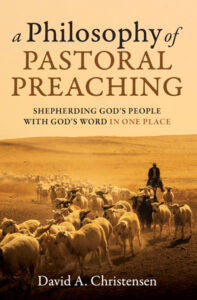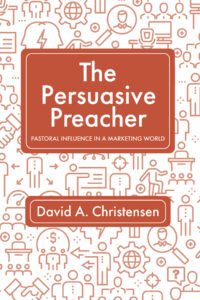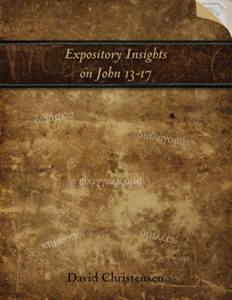Books by David Christensen
“I am a pastor. I preach. Doesn’t that make me a pastoral preacher?” Not necessarily. Many preach missional rather than pastoral sermons designed to appeal to the unchurched, not the churched. The popularity of regional churches and the global reach of the internet allow preachers to focus their sermons on people they do not know and market a message to an audience they never see. Evangelical leaders produce many resources on attractional preaching, but who is developing a vision for pastoral preaching? David Christensen draws on years of experience to develop a philosophy of pastoral preaching. He writes, “Social media changes the way we preach. More and more pastors are preaching clickbait sermons. These are sermons designed to get clicks or attract interest rather than teach truth. We want catchy titles and clever analogies that will grab people’s attention because the digital world is built on attention, whatever will get likes or drive outrage.” However, pastoral preaching builds community. It is rooted in local soil to the people we know in the place we live. We need a philosophy of preaching that shepherds a community of disciples who worship together in one place.
Also available on:
How can we preach persuasively without huckstering, manipulating, or coercing people? Sadly, we are seeing the fall of many pastors not for reasons of sexual immorality, but the pursuit of pride and power. The skillful use of marketing methods creates celebrity pastors who become significant influencers in the evangelical church. The lure of success is seductive, turning pastors into hucksters and Christians into consumers. We need to heed the warnings of the New Testament about the pride of rhetoric and the pursuit of power. David Christensen carefully analyzes the biblical warnings of Paul about the temptations of rhetorical sophistry in the first-century church and applies them to pastoral ministry today. God calls preachers to be ethical and effective persuaders. David develops an ethical grid for pastoral persuasion using principles drawn from the Bible and social science along with practical illustrations from his years of ministry. He calls preachers to be ethical and effective persuaders by emphasizing the centrality of the word of God while depending on the power of the Spirit of God.
Also available on:
Our Heavenly Father has adopted us into His family and our adoption is the foundation for our transformation. Spiritual transformation is a gradual process of change as we learn the ways of our Father. Christians want to live a victorious life immediately. Talk of being radical or revolutionary Christians excites us but these descriptions imply that other Christians are lesser members of the family of God. Many consider the normal Christian life inferior to the higher Christian life. What is a normal Christian life? The Apostle Paul describes a normal Christian Life in Romans 6-8.
Is your Christian life dull and dry, full of rituals and responsibilities without any passion or joy? Has your obedience become a duty and your faith turned into an obligation? Renew your relationship with Jesus through this study of John 13-16. Jesus invites you to be His friends not merely His servants. Kindle the passion of fresh friendship with Jesus as He opens His heart to you in these chapters. His self-disclosure encourages your transparency as you explore what it means to be friends with Jesus.
Expository preaching exposes the ideas in the biblical unit of thought, so the sermon follows the flow of the passage. The hearers should be able to think their way through the passage after the sermon has been preached. The preacher seeks to visualize the flow of thought – to picture the structure of the passage. The sermon should expose the hinges on which the passage swings by developing an outline based on the structure but written in contemporary language. This workbook provides a structural diagram based on the Greek text side by side with a format for the expositor to develop an outline from the passage. Short, practical insights add exegetical depth and sermon seed thoughts to help the preacher flesh out the message.
Expository preaching exposes the ideas in the biblical unit of thought, so the sermon follows the flow of the passage. The hearers should be able to think through the passage after the sermon has been preached. The preacher seeks to visualize the flow of thought – to picture the structure of the passage. The sermon should expose the hinges on which the passage swings by developing an outline based on the structure but written in contemporary language. This workbook provides a structural diagram based on the Greek text side by side with a format for the expositor to develop an outline from the passage. Short, practical insights add exegetical depth and sermon seed thoughts to help the preacher flesh out the message. The workbook encourages the preacher to mine the riches of 2 Corinthians 2:14-7:4 for personal growth and sermon preparation.
Forgiveness is not easy despite the pictures painted in many sermons. We all struggle to forgive the hurts we feel. Bitterness and resentment threaten our souls if we do not release the poison to God. Pastor David Christensen deals honestly with the pain we feel while pointing us to the wonderful release we can enjoy when we give and receive forgiveness. The book uses the metaphor of faces to teach about forgiveness. The faces of those who experience healing form the backdrop for a theology of forgiveness. David lays out the practical steps we must take to experience the healing power of forgiveness.
Perdonar no es fácil, aunque así lo parezca en los cientos de sermones que hablan de ello. Luchamos por perdonar nuestras heridas. La amargura y el resentimiento llegan a amenazar nuestras almas cuando no dejamos que el veneno se libere ante Dios. El pastor David Christensen afronta con honestidad el dolor que sentimos, mientras nos enseña el camino a una liberación maravillosa que nos permite disfrutar de dar y recibir perdón. El libro se enfoca en la metáfora de las caras del perdón para enseñarlo desde este punto de vista. Son los rostros de quienes experimentan la sanidad los que forman el trasfondo para una teología del perdón. Existen frentes verticales y horizontales según nuestra mirada, si va a Dios o a los demás. Existen frentes judiciales o relacionales del perdón, según si nuestro trato es con Dios o con los demás para experimentar la sanidad que el perdón trae a nuestros corazones. David prepara los pasos que debemos dar para experimentar el poder sanador del perdón. Debemos aprender a aceptar la gracia, confesar la culpa y liberar el veneno que causa la falta de perdón y que impide la sanidad de nuestras heridas.










